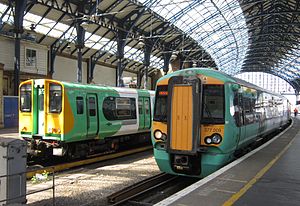Govia Thameslink Railway (GTR) has won a High Court injunction this afternoon (Thursday 2 June) heading off proposed strike action by the train drivers’ union ASLEF.
The company said: “GTR sought an injunction in the High Court over discrepancies in ASLEF’s ballot of drivers for industrial action. This afternoon, the court ruled in GTR’s favour.
“We are pleased that the court has agreed with us and granted an injunction against the ASLEF ballot.
“This means that any industrial action the union was planning cannot now take place. This will come as a great relief to our passengers.
“Following this ruling, we now urge both RMT and ASLEF to return to the negotiating table.”

ASLEF said last week that train drivers on Southern and Gatwick Express routes had voted overwhelmingly in favour of going on strike.
The union’s general secretary Mick Whelan said: “95.8 per cent of our members voted Yes to taking part in industrial action short of a strike and 84.4 per cent voted Yes to taking part in a strike, on a turnout of just over 82 per cent.”
The dispute is about the extension of “driver-only operation” of trains to 12-carriage trains on the Gatwick Express route.
GTR wants drivers to rely on CCTV to decide when it is safe to close the doors on more of its services.
Guards – also known as conductors – will not lose their jobs, the company said, but would be expected to spend more time checking and selling tickets and providing a visible presence on trains.
Members of the RMT union have already been on strike over the proposed changes to their role. They say that safety would be compromised and the changes were driven by a greed for more profit.
GTR said sickness rates among guards had soared since the start of the dispute in April and this has led to a significant number of delays and cancellations.
The RMT said that the company employed too few guards to cover the whole timetable, relying on staff being willing to work overtime.
But they were overstretched, leading to stress, the union said. This had contributed to rising sickness rates.
GTR said that trains with driver-only operation could run if no conductor was available, meaning that there would be a lot less disruption to services.
Passenger dissatisfaction, including a petition of more than 10,000 signatures to Parliament, has prompted calls for GTR to be stripped of its franchise. A response to the petition will be given by a government transport minister although no date for this has been published yet.








All this means is the ballot will be extended to include the former GN and TL drivers. Thus making it ‘legal’ (not that it wasn’t before).
The result will be to drag the Bedford, Peterborough, Cambridge and Kings Lynn services into the dispute